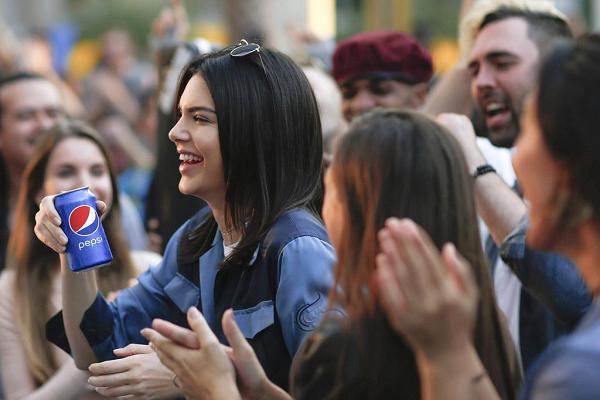
Don’t Lie To Us, Please
By Kate Faigen
In case you missed it, Kendall Jenner ended racism. In the middle of a beautifully blue-hued protest, she bravely handed an ice-cold can of soda to a police officer who subsequently cracked a smile. And get this — Pepsi caught it all on tape (for future research and our viewing pleasure, of course.) If you can detect stale sarcasm as well as we can write it, then you’ll know that we’re referring to the already-infamous Pepsi ad, since pulled, that purports to solve the issues the Black Lives Matter movement represents with a young supermodel and a mix of highly attractive, multi-ethnic protesters.
To recap the commercial (almost as hilariously as SNL did): Ms. Jenner, clad in a blond wig, poses seductively for a photographer. She becomes distracted by a crowd of smiling protesters marching along the street, holding dripping cans of Pepsi and signs that say, “Peace” and “Join the Conversation.” Feeling compelled by the force of the protest (for what, is not clear), Jenner rips off her wig and leads the pack of young, hip protesters; prominently among them, a woman in a traditional Muslim head scarf. Everyone’s laughing and having a great time, until Jenner seeks out a good-looking police officer and hands him a fresh can of soda. Then, everyone erupts into celebration and the cop turns to his colleague and smirks. Racism, finito.
Following the controversial commercial’s release, like-minded Americans took to social media to voice equal parts concern and equal parts disgust. With his rightful, signature snark, satire king and current-event connoisseur Stephen Colbert condemned Pepsi’s insensitive corporate agenda and creation of the “Attractive Lives Matter” movement. “[The protesters in the ad] might as well be holding signs that say ‘We are all the core demographic.’”
In our country’s current state of political chaos, politics in advertising seems almost inevitable. After all, brands must create positive connections with their audience to develop evangelism and credibility. Although a fine line to walk, what better way to grip a strong-willed millennial, for example, than by aligning a narrative around values like racial equality or feminism?
Take Dove’s Real Beauty campaign. Over ten years ago, the soap and shower product maker started to feel the effects of stronger competition. They resuscitated their brand to new life by showcasing “real” women with “real bodies” in their ads, as opposed to taking the age-old stick thin model approach. Dove’s “Campaign for Real Beauty,” fortified by a (seemingly) feminist framework, has brought the brand great success. From the Real Curves ads to the Pro Age products, Dove has supposedly redefined beauty in the consumer world.
While it seems absurd to commend a brand for highlighting realistic standards of beauty, this is simply the nature of advertising, and Dove has been lauded. While the brand often gets it right, they’ve nevertheless missed the mark from time to time, as with retouched ads that preach acceptance. Whether Dove’s messaging resonates with you or not, it has resonated with enough people to generate $4 billion in sales today.
Pepsi, on the other hand, not only completely missed the mark, but completely shit the bed. A statement from the company claims that it meant to project a “global message of unity, peace, and understanding.” What happened instead? CNN Political Commentator Symone Sanders sums it up best: “Literally, Pepsi just used Kendall Jenner to co-opt the resistance to sell a freakin’ can of soda.” By appropriating the Black Lives Matter movement and exploiting social justice to — yes, sell soda — Pepsi quickly dismantled any value of equality and acceptance that it intended to promote.
What elevates a brand to stand apart is not a complex story, but a consistent, compelling, and concise one — one that ultimately reflects an authentic core. Pepsi attempted to articulate its story of great-tasting soda bringing people together. But what it actually articulated in its commercial trivializes our country’s new protest era and flattens the seriousness of its underlying issues. In simpler terms, soda can’t solve racism, and presenting such a story is nothing other than shameful.
Because savvy, creative storytelling breeds audience emotion and fosters connections, brands are wise to surround its stories around its singular values, and differentiate themselves by creating content that appeals to human nature. Let’s face it, consumers are hungry for truth. In today’s mega-digital age, people want to be spoken to, not marketed to. Brands that achieve the highest levels of success do this by situating every piece of content on the company’s foundation of values. But getting lost in the scope of one’s values can oftentimes lead to negative consequences.
Before publicizing an agenda, make sure that it does not belittle centuries of oppression and hardship. Sounds obvious, right? What’s less obvious is this: make sure that your brand does not lie to its audience. On behalf of Pepsi, it looks like we’re drinking Coke tonight.
Kate Faigen is an associate at Woden. Whatever your storytelling needs may be, let Woden help. Download our free StorytellingBlueprint, or send us an email at connect@wodenworks.com to discuss how we can help tell your story.


